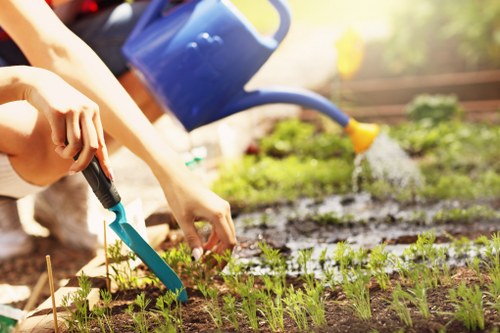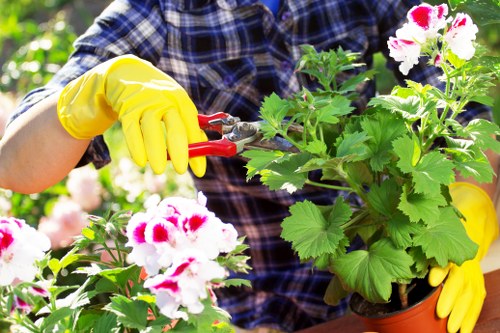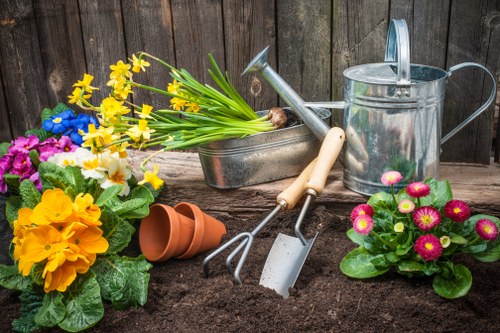Comprehensive Guide to Garden Maintenance in West Ham
Introduction to Garden Maintenance

Maintaining a beautiful garden in West Ham requires dedication, knowledge, and the right tools. Whether you're a seasoned gardener or a novice, understanding the essential aspects of garden upkeep can transform your outdoor space into a lush, vibrant haven.
West Ham's unique climate and soil conditions mean that specific maintenance practices are necessary to ensure your garden thrives year-round. From soil preparation to plant selection, each step plays a crucial role in the overall health of your garden.
In this guide, we'll explore the best practices for garden maintenance in West Ham, providing you with actionable tips and strategies to keep your garden in top shape.
Soil Preparation and Health

Healthy soil is the foundation of a thriving garden. In West Ham, the soil composition can vary, so it's essential to test and amend your soil accordingly. Start by conducting a soil test to determine its pH level and nutrient content.
Once you know your soil's condition, you can make informed decisions about the amendments needed. Adding organic matter, such as compost or well-rotted manure, can improve soil structure, drainage, and fertility.
Regularly aerating your soil helps prevent compaction, allowing roots to grow deep and access essential nutrients. Mulching is another effective practice, as it retains moisture, regulates temperature, and suppresses weeds.
Plant Selection and Care

Choosing the right plants is critical for successful garden maintenance in West Ham. Opt for native species that are well-adapted to the local climate and soil conditions. Native plants are generally more resilient, require less water, and are less susceptible to pests and diseases.
When selecting plants, consider their growth habits, sunlight requirements, and water needs. Grouping plants with similar needs together can make maintenance more manageable and ensure each plant thrives.
Regular pruning and deadheading promote healthy growth and flowering. It's essential to remove any damaged or diseased plant parts promptly to prevent the spread of issues throughout your garden.
Watering and Irrigation

Proper watering is a cornerstone of effective garden maintenance. West Ham's weather can be unpredictable, so it's important to adapt your watering schedule to current conditions. Overwatering can lead to root rot and other fungal diseases, while underwatering stresses plants and inhibits growth.
Implementing an efficient irrigation system, such as drip irrigation or soaker hoses, can provide consistent moisture directly to the plant roots, reducing water wastage and minimizing evaporation.
Mulching around plants helps retain soil moisture and reduces the frequency of watering. Additionally, watering early in the morning or late in the evening minimizes water loss due to evaporation and allows plants to absorb moisture more effectively.
Pest and Disease Management

Managing pests and diseases is essential for maintaining a healthy garden in West Ham. Regular monitoring allows you to identify and address issues before they become severe. Look for signs of common pests such as aphids, slugs, and caterpillars, as well as symptoms of fungal infections.
Adopt integrated pest management (IPM) practices, which combine biological, cultural, and chemical methods to control pests sustainably. Encourage beneficial insects like ladybugs and lacewings that prey on harmful pests, and use organic pesticides when necessary to minimize environmental impact.
Preventative measures, such as proper sanitation, crop rotation, and selecting disease-resistant plant varieties, can significantly reduce the likelihood of pest and disease outbreaks in your garden.
Seasonal Garden Maintenance
Spring Maintenance

Spring is a time of renewal and preparation for the growing season. Start by clearing away any debris from the winter months, such as fallen leaves and dead plant material. This helps prevent pests and diseases from taking hold as new growth begins.
Pruning deciduous trees and shrubs encourages healthy growth and shapes the plants for the upcoming season. Planting new flowers, vegetables, and herbs during spring sets the stage for a bountiful summer.
It's also an ideal time to fertilize your garden, providing plants with the nutrients they need to thrive throughout the year.
Summer Maintenance

Summer maintenance focuses on sustaining plant health during the hot months. Regular watering is crucial, especially during heatwaves, to prevent drought stress. Mulching becomes even more important in retaining soil moisture and keeping roots cool.
Weeding is essential in summer to reduce competition for water and nutrients. Additionally, monitor plants for signs of pests and diseases, addressing issues promptly to maintain garden vitality.
Pruning flowers after they bloom encourages continuous blooming and prevents plants from becoming overgrown.
Autumn Maintenance

Autumn is the time to prepare your garden for the colder months. Begin by harvesting any remaining vegetables and removing spent annuals. Clearing out old plant material reduces overwintering sites for pests and diseases.
Planting spring bulbs, such as tulips and daffodils, ensures vibrant blooms in the coming year. Additionally, top-dressing beds with compost adds essential nutrients to the soil, enhancing fertility for spring growth.
Rake fallen leaves and either compost them or use them as mulch to protect perennials and trees from frost damage.
Winter Maintenance

Winter maintenance involves protecting your garden from harsh weather conditions. Mulch perennials to insulate roots from freezing temperatures, and cover sensitive plants with frost cloths or burlap.
Prune dormant trees and shrubs to promote healthy growth in the spring. This is also an excellent time to plan and design any changes or new plantings for the upcoming year.
Ensure tools and equipment are cleaned, sharpened, and stored properly to extend their lifespan and maintain their effectiveness for the next gardening season.
Tools and Equipment for Garden Maintenance
Essential Gardening Tools

Having the right tools is essential for efficient garden maintenance. Some of the must-have tools for West Ham gardeners include:
- Pruners: For trimming and shaping plants.
- Spades and Shovels: For digging and soil preparation.
- Rakes: To gather leaves and debris.
- Watering Equipment: Such as hoses, sprinklers, or drip irrigation systems.
- Garden Fork: For turning and aerating soil.
Investing in high-quality tools not only makes maintenance easier but also ensures better results and longer tool lifespan.
Advanced Gardening Equipment
Irrigation Systems
Installing an efficient irrigation system can save time and water, ensuring your plants receive consistent moisture. Drip irrigation and soaker hoses are popular choices for their water-saving benefits.
Automated systems with timers allow for precise control over watering schedules, reducing the risk of over or under-watering.
- Drip Irrigation: Delivers water directly to the plant roots.
- Soaker Hoses: Efficiently wet the soil without wetting the foliage.
- Rain Sensors: Prevents watering during rainfall, conserving water.
Proper installation and regular maintenance of your irrigation system are crucial for optimal performance.
Composting and Soil Enrichment
Benefits of Composting

Composting is an excellent way to recycle organic waste and enrich your garden soil. It reduces landfill waste and provides a nutrient-rich amendment that improves soil structure, fertility, and moisture retention.
To start composting, set up a compost bin or pile in a convenient location. Add a balanced mix of green materials (like vegetable scraps and grass clippings) and brown materials (such as fallen leaves and straw).
Turn the compost regularly to aerate it and speed up the decomposition process. In a few months, you'll have dark, crumbly compost ready to enhance your garden beds.
- Vegetable Scraps
- Grass Clippings
- Fallen Leaves
- Straw or Hay
Pest Control Strategies
Natural Pest Control

Adopting natural pest control methods is not only environmentally friendly but also sustainable in the long run. Encouraging beneficial insects, such as ladybugs and predatory beetles, helps keep pest populations in check.
Using organic pesticides, like neem oil or insecticidal soaps, can effectively manage pests without harming beneficial organisms or contaminating the soil.
Implementing physical barriers, such as row covers and netting, protects plants from larger pests like birds and rabbits, ensuring your garden remains healthy and productive.
Enhancing Garden Aesthetics
Pathways and Hardscaping

Introducing pathways and hardscaping elements adds structure and visual interest to your garden. Stone paths, gravel walkways, and wooden decking create defined spaces, making maintenance easier and enhancing the overall appeal.
Incorporating features like pergolas, benches, and decorative stones can transform your garden into a relaxing retreat, perfect for enjoying the beauty of West Ham's natural surroundings.
- Stone Paths
- Gravel Walkways
- Wooden Decks
- Decorative Features
Lighting and Irrigation Automation
Garden Lighting Solutions

Proper lighting enhances the beauty and functionality of your garden, allowing you to enjoy it even after sunset. Solar-powered lights, LED fixtures, and string lights are popular choices that provide both illumination and ambiance.
Strategic placement of lights highlights focal points like pathways, benches, and feature plants, creating a magical atmosphere during the evening hours.
Automated irrigation systems with timers ensure that your garden receives consistent watering without manual intervention, making maintenance more efficient and hassle-free.
Seasonal Planting and Rotation
Effective Plant Rotation Practices

Implementing plant rotation helps prevent soil depletion and reduces the risk of pest and disease buildup. By varying the planting locations of different plant families each season, you promote healthier soil and more robust plant growth.
Plan your garden layout with rotation in mind, ensuring that deep-rooted and shallow-rooted plants are alternated to maintain soil structure and nutrient balance.
- Rotate Vegetable Crops
- Alternate Plant Families
- Maintain Soil Health
Keeping detailed records of plantings and rotations can aid in effective garden management, ensuring sustainable productivity year after year.
Hiring Professional Garden Maintenance Services
Benefits of Professional Services

While DIY garden maintenance is rewarding, hiring professional services in West Ham can provide expertise and save you time. Professional gardeners have the knowledge and experience to address specific challenges posed by the local environment.
They offer a range of services, including soil testing, pest management, pruning, and landscape design, ensuring that every aspect of your garden is well-cared for.
Moreover, professional maintenance can enhance the curb appeal and value of your property, making it a worthwhile investment.
Choosing the Right Garden Maintenance Company
When selecting a garden maintenance company in West Ham, consider factors such as experience, reputation, and range of services offered. Look for companies with positive reviews and a portfolio of successful projects that align with your garden's needs.
Ensure that the company is certified and insured, providing peace of mind that your garden is in capable hands. Transparent pricing and clear communication are also essential qualities to look for in a reliable service provider.
- Experience and Expertise
- Reputation and Reviews
- Range of Services
- Certification and Insurance
Don't hesitate to ask for references or visit previous projects to assess the quality of their work before making a decision.
Eco-Friendly Garden Maintenance Practices
Sustainable Gardening Techniques

Adopting eco-friendly practices not only benefits the environment but also promotes a healthier garden. Techniques such as composting, rainwater harvesting, and using organic fertilizers contribute to sustainable garden maintenance.
Choosing native and drought-resistant plants reduces water usage and supports local biodiversity, creating a garden that harmonizes with West Ham's natural ecosystem.
Implementing integrated pest management and avoiding chemical pesticides minimizes environmental impact and fosters a safe habitat for beneficial insects and wildlife.
Composting and Organic Fertilizers
Benefits of Organic Fertilizers

Using organic fertilizers enhances soil health by adding essential nutrients and promoting beneficial microbial activity. Unlike synthetic fertilizers, organic options improve soil structure and fertility naturally, supporting long-term plant growth.
Organic fertilizers, such as bone meal, fish emulsion, and compost tea, provide a steady release of nutrients, preventing the risk of nutrient burn and fostering a balanced ecosystem within your garden.
- Bone Meal
- Fish Emulsion
- Compost Tea
Incorporating organic fertilizers into your maintenance routine ensures that your garden remains vibrant and healthy without harming the environment.
Rainwater Harvesting Systems
Installing Rain Barrels

Rainwater harvesting is an effective way to conserve water and reduce utility bills. Installing rain barrels collects runoff from your roof, providing a sustainable water source for your garden during dry periods.
Using harvested rainwater for irrigation minimizes dependence on municipal water supplies and ensures that your plants receive pure, chemical-free moisture.
Properly maintained rain barrels include screens to filter out debris and overflow systems to prevent spillage during heavy rains.
Mulching for Moisture Retention
Types of Mulch

Mulching is a versatile practice that offers numerous benefits, including moisture retention, temperature regulation, and weed suppression. Organic mulches, such as bark, straw, and leaf mold, enrich the soil as they decompose.
Inorganic mulches, like gravel and rubber, provide long-lasting coverage without adding nutrients to the soil. Choosing the right type of mulch depends on your garden's specific needs and aesthetic preferences.
- Bark Mulch
- Straw Mulch
- Gravel Mulch
Applying a layer of mulch around your plants protects roots from extreme temperatures and reduces the need for frequent watering, promoting overall plant health.
Final Tips for Successful Garden Maintenance
To achieve and maintain a stunning garden in West Ham, consider the following final tips:
- Plan and Schedule: Develop a maintenance schedule that outlines tasks for each season, ensuring nothing is overlooked.
- Stay Informed: Keep up with the latest gardening trends and techniques to continuously improve your garden's health and beauty.
- Monitor Regularly: Regular inspections help identify and address issues promptly, preventing minor problems from escalating.
- Invest in Quality: High-quality tools and materials may have a higher upfront cost but offer greater durability and better results in the long run.
- Embrace Sustainability: Implement eco-friendly practices to create a garden that is both beautiful and environmentally responsible.
By following these guidelines and staying committed to regular maintenance, your West Ham garden will flourish, providing a serene and inviting outdoor space for years to come.
Contact us today to schedule your garden maintenance service and transform your outdoor space into a paradise.